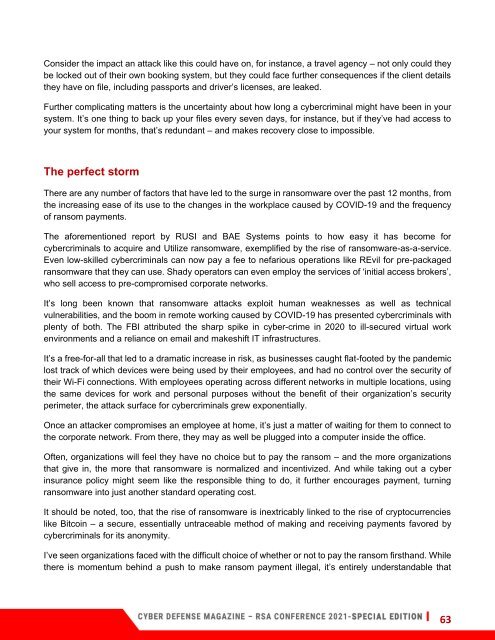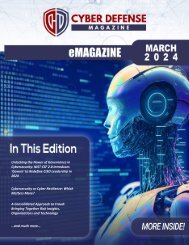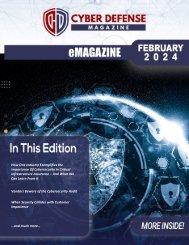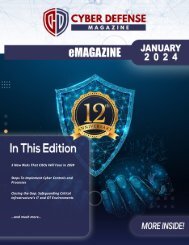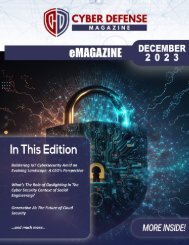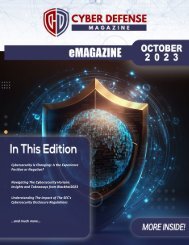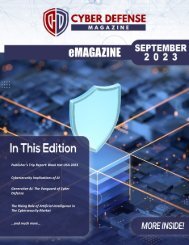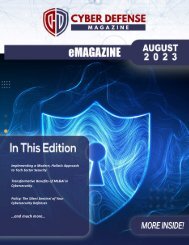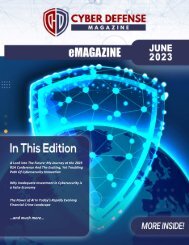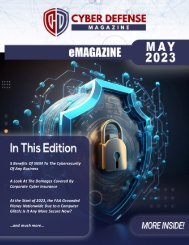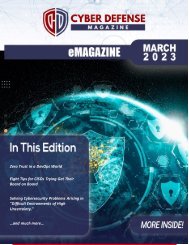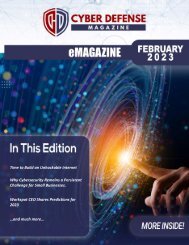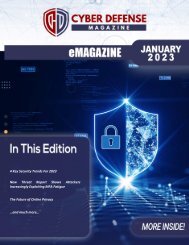Cyber Defense Magazine Special Annual Edition for RSA Conference 2021
Cyber Defense Magazine Special Annual Edition for RSA Conference 2021 - the INFOSEC community's largest, most popular cybersecurity event in the world. Hosted every year in beautiful and sunny San Francisco, California, USA. This year, post COVID-19, virtually with #RESILIENCE! In addition, we're in our 9th year of the prestigious Global InfoSec Awards. This is a must read source for all things infosec.
Cyber Defense Magazine Special Annual Edition for RSA Conference 2021 - the INFOSEC community's largest, most popular cybersecurity event in the world. Hosted every year in beautiful and sunny San Francisco, California, USA. This year, post COVID-19, virtually with #RESILIENCE! In addition, we're in our 9th year of the prestigious Global InfoSec Awards. This is a must read source for all things infosec.
Create successful ePaper yourself
Turn your PDF publications into a flip-book with our unique Google optimized e-Paper software.
Consider the impact an attack like this could have on, <strong>for</strong> instance, a travel agency – not only could they<br />
be locked out of their own booking system, but they could face further consequences if the client details<br />
they have on file, including passports and driver’s licenses, are leaked.<br />
Further complicating matters is the uncertainty about how long a cybercriminal might have been in your<br />
system. It’s one thing to back up your files every seven days, <strong>for</strong> instance, but if they’ve had access to<br />
your system <strong>for</strong> months, that’s redundant – and makes recovery close to impossible.<br />
The perfect storm<br />
There are any number of factors that have led to the surge in ransomware over the past 12 months, from<br />
the increasing ease of its use to the changes in the workplace caused by COVID-19 and the frequency<br />
of ransom payments.<br />
The a<strong>for</strong>ementioned report by RUSI and BAE Systems points to how easy it has become <strong>for</strong><br />
cybercriminals to acquire and Utilize ransomware, exemplified by the rise of ransomware-as-a-service.<br />
Even low-skilled cybercriminals can now pay a fee to nefarious operations like REvil <strong>for</strong> pre-packaged<br />
ransomware that they can use. Shady operators can even employ the services of ‘initial access brokers’,<br />
who sell access to pre-compromised corporate networks.<br />
It’s long been known that ransomware attacks exploit human weaknesses as well as technical<br />
vulnerabilities, and the boom in remote working caused by COVID-19 has presented cybercriminals with<br />
plenty of both. The FBI attributed the sharp spike in cyber-crime in 2020 to ill-secured virtual work<br />
environments and a reliance on email and makeshift IT infrastructures.<br />
It’s a free-<strong>for</strong>-all that led to a dramatic increase in risk, as businesses caught flat-footed by the pandemic<br />
lost track of which devices were being used by their employees, and had no control over the security of<br />
their Wi-Fi connections. With employees operating across different networks in multiple locations, using<br />
the same devices <strong>for</strong> work and personal purposes without the benefit of their organization’s security<br />
perimeter, the attack surface <strong>for</strong> cybercriminals grew exponentially.<br />
Once an attacker compromises an employee at home, it’s just a matter of waiting <strong>for</strong> them to connect to<br />
the corporate network. From there, they may as well be plugged into a computer inside the office.<br />
Often, organizations will feel they have no choice but to pay the ransom – and the more organizations<br />
that give in, the more that ransomware is normalized and incentivized. And while taking out a cyber<br />
insurance policy might seem like the responsible thing to do, it further encourages payment, turning<br />
ransomware into just another standard operating cost.<br />
It should be noted, too, that the rise of ransomware is inextricably linked to the rise of cryptocurrencies<br />
like Bitcoin – a secure, essentially untraceable method of making and receiving payments favored by<br />
cybercriminals <strong>for</strong> its anonymity.<br />
I’ve seen organizations faced with the difficult choice of whether or not to pay the ransom firsthand. While<br />
there is momentum behind a push to make ransom payment illegal, it’s entirely understandable that<br />
63


